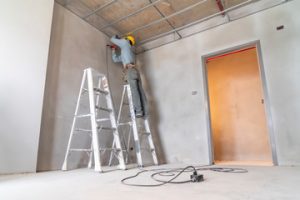Many issues can go wrong with your ceilings. Some, such as a sagging section or water damage, are serious and should be dealt with by Ceiling Repairs Perth professionals.
Others, such as a drywall crack or odd smell, may be minor but should still be addressed. It is important to know the warning signs of a damaged or deteriorating ceiling so that you can take prompt action.

Drywall Cracks
Drywall cracks are often seen as a sign of structural problems, but they can also be caused by many different things. Cracks that run straight down walls or along drywall seams can be a sign of poor workmanship during construction and should be addressed by a professional. Similarly, cracks that are wide or diagonal may indicate a problem with the foundation of your home, and they need to be inspected by a building professional as soon as possible.
Small cracks that appear around windows and doors are often a result of the natural settling of your home and can be fixed with simple patching and repainting. However, if you notice that these cracks are recurring or getting worse, they may be a sign of deeper structural issues that need to be addressed by a drywall contractor.
Cracks that appear along drywall seams are most commonly a sign of water damage in your ceiling, and they can quickly escalate into more serious (and expensive) repairs if not treated promptly. These types of cracks typically show up near windows, in basements, and in other areas where moisture tends to collect. Left untreated, these cracks can lead to mold growth and other health concerns in your home. In addition, if you notice that a crack is accompanied by other signs of structural damage, like sagging walls or bowed floors, it’s important to call in a building professional right away.
Mold and Mildew
While we often use the terms mildew and mold interchangeably, they are not the same thing. Mildew is a specific type of mold that develops on the surface of damp areas, such as showers and walls, and has a powdery texture. Mold, on the other hand, is a general term that can refer to several different kinds of fungi. This can include anything from simple household fungi to more dangerous forms that can cause serious health problems, especially for those with respiratory issues.
Both kinds of fungi thrive in areas where moisture is present for prolonged periods and release tiny, lightweight spores into the air. These spores are then inhaled by those who come into contact with them. If you are sensitive to mold, inhaling these spores can cause symptoms such as coughing, sore throat, and headaches.
While it’s not as dangerous as mold, if you notice mildew or other signs of a fungus in your home, it is important to address the problem right away to avoid further damage to your home and health. Fix any leaks and keep humidity levels low. Scrub and dry all surfaces, including porous materials such as fabric and upholstery. If it is unavoidable that these items have become moldy, consider bringing them outside to be cleaned or calling a professional mold remediation specialist.
Odd Smells
Odd smells in the home are not only unpleasant, but they can also indicate serious issues that should be addressed immediately. Fishy or musty odors are warning signs of leaks, mold, and other problems that require professional repair or replacement. If these odors persist, a plumber, carpenter, or drywall specialist should be called. Odd odors may also be indicative of brain-related conditions, such as epilepsy or Alzheimer’s disease. This symptom is known as phantom smells, or olfactory hallucinations.
Age
If you notice that your home’s ceiling is getting on in years, it’s a good idea to get a professional inspection right away. This may indicate that the structure is weakened and needs repairs, especially if cracks and discoloration are present. The problem could be due to age-related wear and tear, or it could be a sign of other underlying issues, like a collapsed support beam or sagging sections of the drywall.
A professional can help you decide which course of action to take and ensure that the repairs are done correctly. The cost of a professional repair is often more than DIY options, but it can save you time and money in the long run by avoiding repeated repairs.
Water damage can lead to a host of problems, including mold, mildew, and crumbling drywall. These issues can cause serious health problems and should be dealt with immediately. The cause of the leak should be identified and repaired; otherwise, the damage will just keep recurring.
Crumbling drywall and sagging sections are a serious problem that must be addressed as soon as possible. If left unattended, these issues can compromise the structural integrity of your home and can lead to a collapsed ceiling. These signs can be hard to spot and may be caused by a variety of problems, including structural damage, poor construction, or weather.